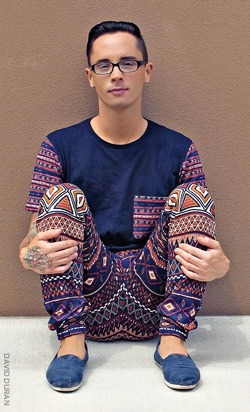 I was homeless, forgotten, abandoned and alone, a product of the Texas foster care system. I had no one.
I was homeless, forgotten, abandoned and alone, a product of the Texas foster care system. I had no one.
My life was reduced to two sets of clothes, a well-worn backpack and the streets. By day, I begged strangers for change; by night, I was turning tricks for a place to stay, a shower, a hot meal or whatever resources I could trade my body for. That was my reality.
The many years I had spent growing up in foster care took away any chance I had at a normal life. I lived in more than 20 different homes, moving as often as every six to eight months, and never staying in one place long enough to create support systems, build community or establish roots. Sometimes I think that maybe this was for the better, because almost all of the homes I lived in were full of abuse.
By the time I was 18, I had been raped and beaten more times than I care to remember—often by the very people the state of Texas was paying to “care” for me.
On the streets, I found out quickly that there aren’t a lot of resources for homeless youth in Houston, especially if you’re gay. I remember once being turned away from the Covenant House—a homeless shelter that caters to youth—after an intake worker determined I was gay and suggested that I “probably had AIDS” and would be a risk to other youth in the shelter.
So I learned to make do with what I had. Most nights, I would wander the streets in Montrose until someone picked me up. Sometimes I’d get lucky and they’d let me spend the night, but more often than not, I’d be forced to sleep on the roof of a shopping strip on the north side of Houston, no more than 10 blocks away from the group home I was living at when I aged out of the system and into homelessness.
I spent the next six months on the streets doing this over and over again, living day-to-day, surviving through the street economy—alone, ashamed and guilt-ridden.
One day in August of 2010, I was in downtown Houston searching for an air-conditioned space and a restroom when I walked into the University of Houston, Downtown. That day, the course of my life changed.
Youth who age out of the foster care system in Texas are eligible for a tuition waiver that covers the complete costs of tuition and fees at state-funded institutions of higher learning within the state.
It was on that fateful day in August that I found out about this waiver, and with the help of university staff I registered for classes and applied for financial aid. I spent the majority of my first semester homeless, struggling to keep up with my course work—but eventually I would receive a refund check for about $2,000 that I used to get my first apartment.
I live in that very same apartment today, and in May of this year, I graduated from the University of Houston, Downtown, with a bachelor’s degree in social work. By the grace of God I am now a strong, resilient, intelligent and contributing member of my community. I am worth something—and so is every other homeless youth.
My life is proof that we can change the future of thousands of youth forced into homelessness by simply valuing their lives, making investments into their futures, and recognizing that they are worth more than a few bucks and some leftover lunch.
I share my story to tell you that there is hope, there is life after homelessness, and our lives do matter. We are the future. Invest in us, value us, recognize our worth and watch us soar to unimaginable heights.
Falling Through
Kristopher Sharp, an HIV-positive gay advocate from Texas, shared his personal story in an opinion piece titled “Falling Through the Cracks: My Struggle to Survive as a Homeless Youth.” Here is an edited excerpt.






1 Comment
1 Comment